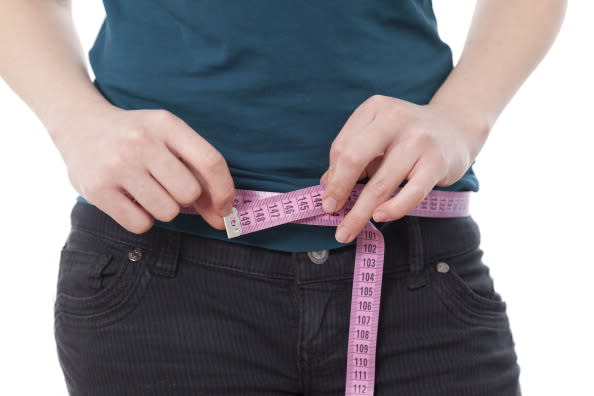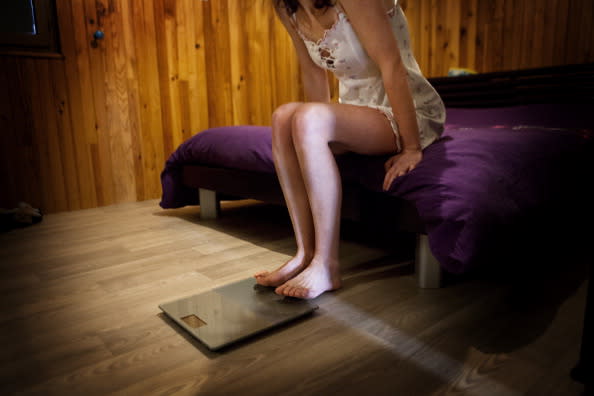Why food tracking weight loss apps can be so dangerous for someone with OCD
Why food tracking weight loss apps can be so dangerous for someone with OCD

Photo: Getty Images
WeightWatchers, MyFitnessPal — I’ve tried ‘em all. And yes, they’ve helped me lose weight when I needed it. But as a person who struggles with Obsessive-Compulsive Disorder (OCD), I’ll never use them again.
In the beginning, these tools truly helped me learn how to eat well. I realized how important it really was to eat fruits and vegetables, how lean proteins can keep you full, and I learned all about portion sizes.
A photo posted by @kdrojen on Aug 7, 2016 at 2:25pm PDT
But quickly, these tools triggered and heightened my OCD in a way that quickly spiraled out of control. I had friends and family who said I was fixating on food, but I shook them off.
Then, a therapist casually asked me how much of my brain space was taken up by eating and weight management, I said about 70 percent. It was only when she replied with an astonished, “That’s a lottttttt,” that I realized it was a problem. I was weighing myself multiple times a day, constantly thinking about my WeightWatchers “points,” and planning almost my entire life around eating and exercise: it had taken over.
With an estimated 45 million Americans dieting each year, and an estimated 3.3 million people in the U.S. struggling with OCD, I find it my duty to share my personal experiences with food tracking, and my thoughts on why OCD and food tracking don’t mix.
Measurement Hell
Whether it was measuring the EXACT (1.222) amount of ounces in a recipe, or comparing measurements of my waist, hips, and thighs tri-weekly, the concept of measurement quickly took over my mind grapes. If I couldn’t measure food portions to the T, or if I didn’t know the exact nutrition facts of something, I wouldn’t go near it. This made it extremely difficult to eat or drink during family gatherings, friend outings, public events, etc. When people talked about how good Aunt Julie’s
delicious homemade cookies, I was trying to calculate its value, decide whether I had enough “points” to afford a cookie, guess how many grams of sugar were in the cookie, etc.
I was compulsively over-measuring anything I consumed, or constantly measuring my progress to hinder the obsessive thoughts. Not fun.
Scales for Days
It was the same deal when I measured my overall weight, too. I was often weighing myself multiple times a day. If I was one pound heavier than I’d been a couple hours ago, I wouldn’t eat until I got the scale back to that number. I even had TWO scales at one point, and measured myself on both — in case one of them wasn’t accurate.
Constant Obsession
Just a few of the thoughts floating around my head for the most of the day — if not all of the time: What am I going to eat? What should I avoid? Did I accurately measure that? Should I re-measure it? I actually look better. Could I look even better? If I could just lose 0.4 pounds… Has anyone told me “You look great” at this party yet? I’ll have to eat before I go that event…
It was exhausting.
Is any of this rational? No. Was it healthy? Absolutely not. Compulsively measuring food, weighing myself, over-exercising, and obsessively counting calories to battle my weight obsession was a serious side-effect of tracking for me as a person with OCD.
A photo posted by Kathryn Larson (@coachkakers) on Aug 8, 2016 at 2:44pm PDT
Food tracking is meant to help people obtain a healthier lifestyle, and it works for millions of people – but for someone who has OCD, it actually leads to a very unhealthy lifestyle. Now, I’ve thrown out the scales, eat well when I’m hungry, treat myself on occasion, and stay as active as possible.
I’m happier and healthier than ever, without tracking my food. And that, my friends, is much better than any app owning my life.
Amanda Pflieger is a 23 year old Chicago transplant, currently living in Los Angeles. When not making movies, Amanda enjoys rescuing dogs, going on outdoor adventures, seeing live music, reading non-fiction, and shopping at the Hollywood Farmer’s Market. Follow her on Instagram and Twitter.
The post Why food tracking weight loss apps can be so dangerous for someone with OCD appeared first on HelloGiggles.




